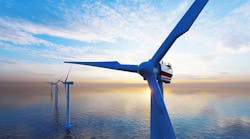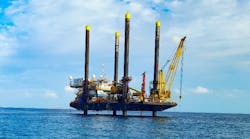BP says that the U.S. government is withholding evidence that would show that the Macondo oil spill was smaller than claimed, according to multiple media sources.
One of these – a Bloomberg report – says that BP has identified 10,000 documents, out of more than 80,000 the government sought to suppress, that relate to estimates of the spill. The report cites a filing made in late March in a New Orleans federal court. The U.S. estimated in August 2010 that 4.9 MM bbl of oil, plus or minus 10%, spilled into the Gulf in the wake of the incident.
"Despite the United States' declaration that it was 'ground truth,' the Aug. 2 estimate was in fact the fourth official estimate" to be released, BP reportedly said in the court filing.
BP announced in early March that it would pay at least $7.8 billion to resolve private plaintiffs' claims for economic loss, property damage, and injuries. Nevertheless, a magistrate judge in New Orleans recently predicted that a multi-phase trial over liability for the spill will still go forward. BP and the U.S. Justice Department declined to comment.
U.S. Attorney General Eric Holder said Feb. 28 that the U.S. has a "strong" case over liability for theDeepwater Horizon explosion that killed 11 workers and triggered the biggest offshore oil spill in U.S. history. BP may face as much as $17.6 billion in civil pollution fines under the U.S. Clean Water Act, based on the government's estimate of barrels spilled.
"The United States is using a privilege intended to protect discussions and deliberations in advance of policy determinations to shield documents reflecting discussions and deliberations concerning a factual issue, the amount of oil discharged," BP was reported to have said.
The law provides for fines of as much as $1,100 for each barrel of oil spilled as a result of simple negligence, often described as a failure to exercise ordinary care. The maximum fine will increase to $4,300 a barrel if BP or the other defendants are found to have been grossly negligent, meaning a conscious action or omission caused the spill.
BP said that "fundamental fairness" requires the disclosure of documents that may help it in its defense. "It is the United States that has brought this case, seeking large monetary penalties against BP," the oil company said, according to the report. "When the government seeks relief, it is fundamentally unfair to allow it to evade discovery."
U.S. Magistrate Judge Sally Shushan reportedly expects the liability case to proceed, and informed BP, Transocean, and Halliburton of that expectation; as well as well as attorneys for the federal and several state governments.
"I think we're going forward with the remainder" of the liability case over the explosion, and then the government's environmental claims will be heard in a separate phase of the trial on "source control" for the spill, Shushan reportedly said in late March.
Shushan's job is to make recommendations on evidentiary issues in the case to U.S. District Judge Carl Barbier, who is overseeing the consolidated spill litigation. Barbier is scheduled to hold a closed-door meeting with lawyers for the parties May 3 to discuss how to proceed with the case. The case is "In re Oil Spill by the Oil RigDeepwater Horizon in the Gulf of Mexico on April 20, 2010, MDL-2179," in U.S. District Court, Eastern District of Louisiana (New Orleans).
The accord BP reached in early March with businesses and individuals is to be paid from a $20-billion trust set up in 2010 for victims. BP has set aside $37 billion to cover spill costs.
BOEM calls for comments on Eastern Gulf of Mexico lease sale
The US Bureau of Ocean Energy Management (BOEM) will open a comment period and schedule public meetings regarding the preparation of an Environmental Impact Statement for two proposed Gulf of Mexico Eastern Planning Area lease sales.
"BOEM will use this information to help determine the scope of the issues to be addressed in the Environmental Impact Statement, and to identify and evaluate potential environmental effects related to the proposed sales," said BOEM Director Tommy P. Beaudreau.
The proposed sales area includes 657,905 acres (2,662 sq km) that are more than 120 mi (193 km) offshore Alabama and Florida, where there are currently active leases. Other areas in the Eastern Gulf of Mexico – including the Straits of Florida – are not included in the proposed five-year leasing program.
Details on the scheduled public meetings and the address for written comments can be found athttp://www.archives.gov/federal-register/public-inspection/index.html.
First Subsea to supply Lucius spar mooring line connectors
First Subsea Ltd. has been awarded a contract by Technip USA to supply the mooring line connectors for a new spar platform moored in 7,000 ft (2,134 m) of water in the Lucius field in the Gulf of Mexico.
The Lucius spar will be moored by nine Ballgrab ball and taper mooring connectors attached to polyester mooring lines. The Ballgrab connector comprises a male connector and female receptacle.
Brian Green, general manager, First Subsea Ltd. said: "This is a significant contract, and marks our ninth spar mooring project for Technip. The flexibility and ease of deployment of Ballgrab ball and taper connectors will ensure the deepwater mooring goes smoothly."
Anadarko Petroleum operates the Lucius field (35%), and its partners are Plains E&P (23.3%), ExxonMobil (15%), Apache (11.7%), Petrobras (9.6%), and Eni (5.4%).
VME supplying internals for GoM containment system
VME Process is supplying process internals to Weatherford and Spitzer Industries for four high-pressure separators and four low-pressure separators which are being fabricated for delivery to Marine Well Containment Co. (MWCC) for its expanded containment system.
VME is designing and fabricating the custom vessel internals to be compatible with a range of weather conditions, flow rates, and well fluids.
Pemex signs deepwater oil drilling safety contract
Mexico's state oil monopoly Pemex has signed a contract with Wild Well Control in an effort to boost its safety controls as it moves toward renewed exploration of the deepwater GoM.
According to Reuters, Pemex said in a statement on March 29 that Wild Well Control, which was heavily involved in efforts to cap BP's Deepwater Horizon oil spill, will help Pemex comply with regulations put in place by the country's oil watchdog the National Hydrocarbons Commision (CNH).
Pemex has limited experience in deepwater drilling but estimates there are more than 29 Bboe, some 58% of the country's prospective resources in the Gulf. Mexico needs to exploit that oil to boost government finances, which depend heavily on crude exports.
Oil output from the world's seventh-largest producer has fallen sharply from a 2004 peak of 3.4 MMb/d to stabilize at around 2.5 MMbpd. A 2008 oil reform opened up the nationalized oil sector to more private investment, allowing Pemex to sign oil field operating contracts in deepwater with private companies.
The CNH is concerned Mexico on its own is not ready to take on ultra-deep projects like the Maximino well, which is planned for next year at around 10,000 ft (3,000 m), six times deeper than Pemex has drilled before.
Offshore Articles Archives
View Oil and Gas Articles on PennEnergy.com




